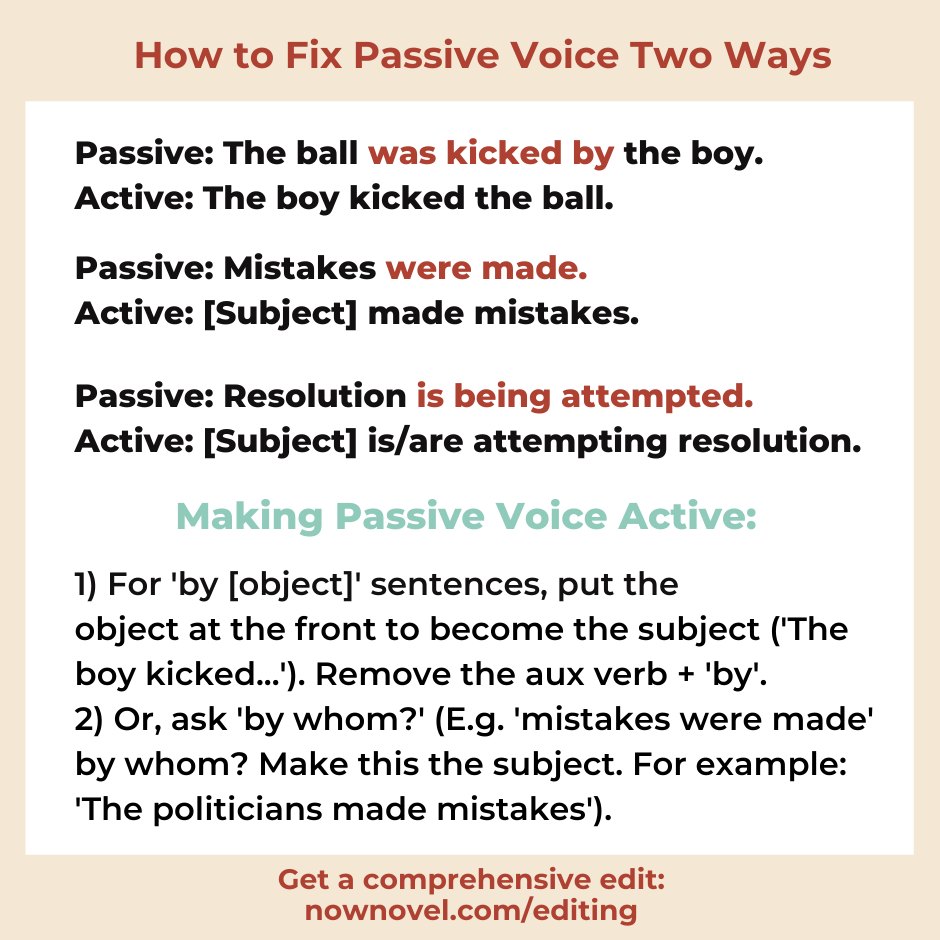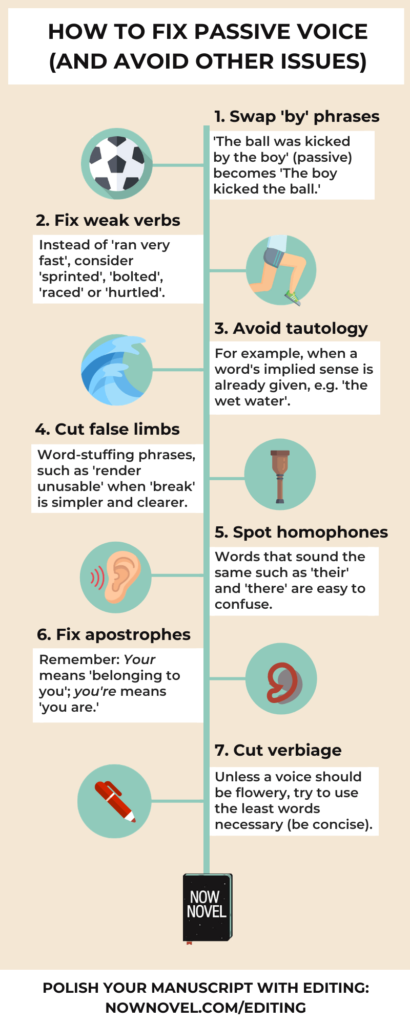Knowing how to fix passive voice and other common grammar and style issues ensures a cleaner, more impactful draft. Read 7 tips for improving weak writing style:
7 ways to make your language more active:
- Fix passive voice not used for effect
- Substitute weak verbs
- Avoid unintended tautology
- Edit out false limbs
- Catch unintended homophones
- Avoid apostrophe catastrophes
- Cut verbiage
Let’s explore how to fix passive voice and other grammar and style issues further:
1. Fix passive voice not used for effect
What is passive voice? It is when the object and action of a sentence are emphasized instead of the subject performing the action. For example:

Take the first example: The boy is the person performing the action. Yet passive voice shifts focus to the experience of the object acted on by the boy’s action. The ball becomes the focus of the action.
There are instances where passive form makes sense. Say, for example, you wanted to use the ball as a viewpoint narrator describing the action of a scene (an odd choice):
The ball was kicked by the top goal scorer, and hurtled full speed towards the goalposts. Yet, just at the last second, the goalkeeper swung a gloved hand, sending it ricocheting to the barrier.
It often makes far more sense to keep the actors in the scene the subjects. This also allows you to describe their subsequent actions, emotions, actively:
The top goal scorer kicked the ball, tensing as it hurtled full speed towards the goalposts …it was going to g-
He groaned when the goalie swung a gloved hand at the last second, sending the ball ricocheting to the barrier.
Here, active voice enables us to describe the action of the scene in fuller, more emotive detail due to the subject performing the action being in focus.
For more tips on changing active to passive and vice versa, see Purdue University’s helpful passive voice guide here.
2. Substitute weak verbs
Understanding how to fix passive voice is the first step in writing punchier sentences.
Substituting weak verbs with more descriptive, connotation-rich ones is also important for good style.
A good tell for weak verbs is if you can spot the adverb ‘very’. For example:
- He ran very fast for the departing train
- The spaceship flew very fast towards the asteroid belt
- He drove very fast around the corner
In each case, there’s a more descriptive, more concise alternative:
- He sprinted for the departing train
- The spaceship hurtled towards the asteroid belt
- He screeched around the corner
‘Sprinted’ has connotations of racing and ‘to bound or spring’ (from the Swedish spritta). ‘Hurtled’ implies uncontrolled movement and impending collision, fitting for the context. ‘Screeched’ combines action with description by using the sound a car tearing around a corner makes as a substitute for ‘very fast’.
To fix weak verbs:
- Look for telltale adverbs such as ‘very’ + simple verbs.
- Use a thesaurus to find verbs with similar meanings.
- Check etymology (the root origins of a word) for interesting connotations to choose the right word (e.g. ‘to bound or spring’ in ‘sprinted’ would be fitting if describing a race or fast activity involving ‘springing’ – a basketball match, for example).
If you are a writer starting out and some of your language skills are patchy, editing services for novels are a worthwhile investment for paying attention to your story’s language subtleties.
3. Avoid unintend tautology
Tautology is unnecessary repetition. There are various kinds of tautology. For example:
- Pleonasm: Using a word that repeats an idea already inferred by another. E.g. ‘She killed him dead’. ‘Killed’ already implies the object is deceased.
- Literal repetition: For example, if we write ‘Please RSVP’ we’re really saying ‘Please Please respond’ (RSVP being short for the French Répondez s’il vous plait which in turn means ‘please respond’).
Avoiding tautology becomes second nature the more you practice writing concise sentences where no word is superfluous.
For more on tautology, read ProWritingAid’s tips and examples here (including poetic uses of tautology as a rhetorical device).

4. Edit out false limbs
False limbs are pithy phrases that are used to inflate word count and make writing or speech sound more important or ‘academic’.
Novel editors are adept at catching and cutting these from manuscripts.
You’ll often find politicians using these. For example, the following false limbs and their simpler equivalents:
- With regard to – regarding
- give rise to – cause/effect [as verb]
- render unusable – break/destroy
- At this point in time – then
Examples of false limbs in sentences:
False limb: ‘With regard to the military, we need to decrease funding.’
Concise: ‘We need to decrease military funding.’False limb: ‘The second world war gave rise to new nationalisms.’
Concise: ‘The second world war caused new nationalisms to emerge.’False limb: ‘Contaminated samples will be rendered unusable.’
Concise: ‘Contaminated samples will be unusable.’False limb: ‘At this point in time, the government had devised a new strategy.’
Concise: ‘The government had then devised a new strategy.’
Avoiding false limbs will make your writing more precise and concise.
5. Catch unintended homophones
There are many mistakes we all make, such as phonetically confusing ‘their’ and ‘there’.
If you are prone to this mistake, it’s simply a matter of remembering to edit for it.
- Try reading sentences backwards – this jolts you out of reading for meaning, helping you focus on particular details
- Make a list of common errors to check for and devote each edit to only a few
Or find professional novel editors for hire who will provide comprehensive, thougtful edits.

6. Avoid apostrophe catastrophes
There are several common apostrophe mistakes:
- Confusing possessive forms and contractions: (e.g. writing ‘your’ (possessive pronoun) for ‘you’re’ (contraction of ‘you are’) or vice versa
- Incorrectly using apostrophes for plurals (‘They spent the weekend at the Joneses’ house’ but ‘The Joneses had a great weekend getaway home’ – no apostrophe for the second non-possessive example)
- Incorrect apostrophe placement: It may look odd, but ‘two weeks’ notice’ is correct (and not ‘two week’s notice’, since ‘weeks’ here are plural)
Another common culprit is ‘it’s’ used as the neuter pronoun. The word it’s is only ever used as a contraction of ‘it is’:
The dog wagged its tail – correct
The dog wagged it’s tail – incorrect (since this parses as ‘the dog wagged it is tail’).
Remember this: Possessive pronouns in the form his/hers/yours/its/theirs/ours never take an apostrophe.
7. Cut verbiage
False limbs, described above, are one type of style issue contributing to verbiage (also known as wordiness).
The issue with verbiage is it often makes the meaning of writing more obscure.
As an example, in the satirical TV series Arrested Development, there is a fictional talk show on the Miracle Network named ‘And As It Is Such, So Also As Such Is It Unto You’.
The verbiage in the name of the show creates humour as the hosts’ repeating of the segment’s name creates an absurd sense of obscurity or meaninglessness.
Verbiage can be used like the above example to create humour, or a flowery, grandiose character. Yet unintentional verbiage will bore your reader. It is thus best to be concise where possible.
Get a quote for our novel editing services and polish your prose so that it shines.


2 replies on “How to fix passive voice (and other common issues)”
The plural of Jones is Joneses, as in the common phrase “keeping up with the Joneses.”
Good catch, Holly – that’s been corrected.